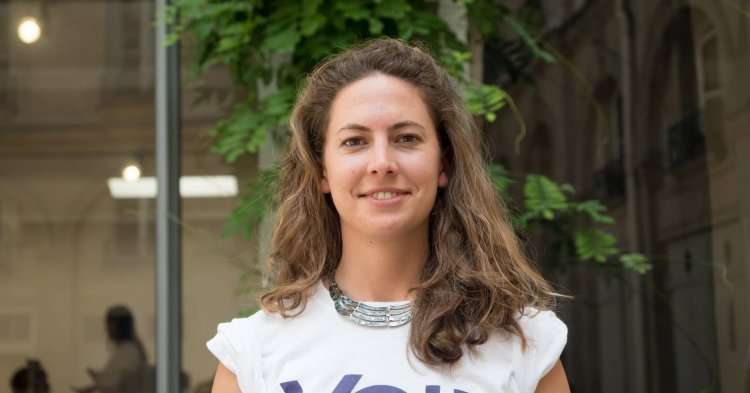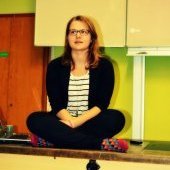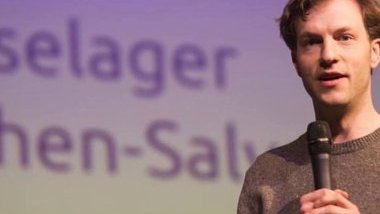Le Taurillon: When was Volt Europa founded and what are its origins?
Valerie Sternberg (VS): Volt Europa was founded last year in March 2017, when an Italian, Andrea Venzon, and a German, Damian Boeselager, met at University in the United States. They met during the Brexit campaign and following the result of the referendum, both of them thought: “we need to do something, we cannot just watch nationalism and authoritarian movements become stronger across Europe and across the world.” They agreed that there was a need for more than just walking around saying “Europe is great” and “democracy is great”. This is how, along with a French friend, they founded Volt, and launched the website when Article 50 was triggered by the United Kingdom in March 2017. Since then, more people joined and it grew.
Le Taurillon: Why is it called “Volt”?
VS: It started of as “Vox”, for “voice”. It sounded nice because we are a voice coming together from all over Europe. Unfortunately, this is also the name of the Spanish party Vox Espana and we didn’t want to be affiliated with them. However, we liked the idea of the V and the O and having a name and not an acronym. Somehow, we came up with Volt which has a nice association with energy and energising Europe.
Le Taurillon: Volt is presenting itself as a pan-European movement [1], but so far it is mostly present in Western European countries. Is Volt seeking to develop in Central and Eastern European countries as well?
VS: We are expanding a lot, two of our biggest teams are from Bulgaria and Romania. For us, the pan-European spirit is very important: we need European solutions, but we also think we need to run at all levels. The European layer is one of it, but problems need to be tackled where they arise or where they can be solved most effectively. It started in the West but we could quickly expand to Romania and Bulgaria and challenge the systems. Not being affiliated with any type of corruption, we are working to bring true democracy back in those societies. Moreover, we have team members from Moldova, Serbia and Lithuania. We aim to increase and support our teams with their particular national challenges as well.
Le Taurillon: When looking back at the 2014 European elections, and the referendum on Brexit, we see that the participation of young people in those votes was very low. How are you planning to address this issue?
VS: What makes Volt unique is three things. First, the content: it is very important to have a vision and content and not run an anti-campaign which would be populist. The second thing is the different layers, we are not only European nor local and national, we are everything. Those layers are interrelated and that’s also what we are trying to do with Volt: every local person has a national counterpart to speak to, which favours communication and allows addressing issues at all levels. Third is how we aim to increase democracy: we are a movement, not a party [2]. In Germany we have either party members or voters, there is nothing in-between. This barrier is hurting democracy, so we have a more community-based approach: followers, volunteers, party members - it’s up to you.
Le Taurillon: Is Volt federalist?
VS: In the sense of ‘do we want a federal state of Europe’? We like the idea of a federal European Union, and we see it as a development that we need to work towards. It would mean that the principle of subsidiarity is a very strong one – problems need be addressed where it makes sense. So, if it makes sense for example to have a European army, that should obviously be managed at federal level, it doesn’t make sense that all the nation states have individual armies. It makes sense to have certain things unified, but for other things it makes sense to have local solutions and provide local policies. However, overcoming the nation state is not a question at the moment: people see it as a point of reference. Our aim now is to understand where to address social, economic and political problems. If the nation state becomes redundant, that’s fine. But at the moment, it’s still the point of reference of many Europeans so we don’t have to overcome this level in the next years.
Le Taurillon: When reading Volt’s manifesto, one can discern two very opposite scenarios: “pro-Europe” and “anti-Europe”, based on whether the European level is regarded as the best solution or not. Do you feel that it is a legitimate platform to run on: just being pro-European? Isn’t it actually damaging the legitimacy of the EU?
VS: No, we don’t believe that’s a legitimate platform, but it is not our platform. That is the biggest difference we want to emphasise between us and political movements such as En Marche – when they initially ran for elections without a programme – or populist movements. We actually want to run on content. Since the very beginning, we have been working intensively on EU reform. We are a team of 50 people working on these policies. We try to debate as much as possible with the whole movement and get input, get feedback to try out new ideas. We think that this is very difficult, it costs us very late nights, but it’s worth it because this is the only way to be sustainable.
We just drafted almost 170 pages of a political programme, which was just approved by the movement. Now we are refining it. We do not want to be reactive. German politics is a good example at the moment of not having a real strategy but only reacting to events and taking little measure that might help in the coming months or couple of years but not in the long run. We really put huge efforts into creating a vision for European society and then translating this into policy actions.
Le Taurillon: What’s your ideal European Union like?
VS: For us, it’s very important that solidarity and the idea of a social union prevails, which means putting the citizens in the center of democracy, not the nations nor corporate interests. Our programme was surrounded around five challenges that we identified at all levels. The first one is the smart state, which means creating a state that is transparent, democratic, accountable, where justice is effective, with equality of opportunities, in education and health care. The second is economic relevance with a focus on social cohesion, triggering growth and developing regions facing difficulties, whilst encouraging innovation.
Third is social equality, creating a European society where discrimination has no place, where equality of opportunities prevails independently of your origin, your religion or your sex. The fourth is global responsibility, which means understanding that we have a European, national and local, but also a global responsibility on issues such as climate change and migrations that need to be tackled at the global and multilateral levels. The fifth is encouraging participatory and inclusive democracy so that citizens can engage outside of the elections. Giving a vote every four to five years is not enough, you need to create a society with debates, where citizens can make a difference, develop their opinions.
Le Taurillon: Although it is very interesting to paint the issue of how the EU should be in 10/20 years, there are also very pressing issues right now, most of them being economic. A number of European nations, first and foremost Greece, are still reeling from the austerity measures of the EU. Do you believe that financial aid must be linked to austerity or should there be debt relief for those countries?
VS: We believe that we need to create an economic and financial system that works for all Europeans. It’s not supposed to be a debate based on whether it’s the Germans who have to pay for the Greeks? The debate should be: how do we come up with economic and financial policies that actually work for all?
I think again that here, the principle of solidarity and working towards a social union is very important because it entails that we as individuals, we as States assume responsibility but we also acknowledge that we need to take responsibility for others. We need to show solidarity towards other people and help them if they are not well-off or in crisis. We need to reform our economy and help the whole of the Union grow by being responsible and by understanding that if we do not take measures, the Union as a whole cannot thrive.
Le Taurillon: How would you achieve that?
VS: At the moment, the economic system, economic policies and Eurozone governance do not benefit everyone and this needs to change. What we propose is having a Eurozone budget, or a ‘Eurozone Plus budget’ as we call it. Something like a European corporate tax would feed this budget that could be used to help countries in times of crisis. This is ruling out the moral hazard in the system because it would put a responsibility on everyone to make sure that the budget is there to help everybody in the Union.
Secondly, once again the social union should be emphasised. I think the weakest in society should always be protected. Therefore, in times of crisis, there always should be a welfare state that is there for these people to help them in economic difficulties.
LT: Volt is not the only pan-European political movement that is being developed. Do you see other pan-European movements such as Diem25 as allies or competition?
VS: I think at this stage it is important to acknowledge that we are working towards at least one goal that is the same: making democracy flourish and to understand that the European Union needs to be reformed in order to survive. We should work together towards this aim and not build up walls.
We should also push other parties that are only national at the moment towards becoming more European. Especially in the context of the European elections in 2019, we need to ensure that all national parties really make European policies and solutions a part of their electoral campaign rather than running only on national issues. We need to give European elections the importance that they should have, and to make the citizens understand what is actually going on rather than downplaying the elections and just focusing on national solutions. I think this should be the goal for us all.
Being competitors can actually only help because this is democracy. We need to unite when we can but we should also spur the debate and be confrontational when it comes to positions that we don’t agree on. It shows that we actually have the same perception of democracy but that it might translate into different political solutions, to different policies, and different ideas of how Europe and European governance should work. Yet, it doesn’t exclude working together towards the same aim of creating a more democratic Europe.
LT: We read that your objective for the European elections is to have candidates in at least seven countries and to form a new group at the European Parliament with your potential MEPs. If you do not have enough MEPs to create a group, will you consider joining another existing group?
VS: That needs to be debated within the movement. Currently, we are focusing so much on getting MEPs from seven different countries elected into the European Parliament to form the first group, that joining another group is a secondary debate.
LT: How are you going to select the candidates that run for the European elections?
VS: It will be an open process where people from outside of Volt can apply as well. We are planning the elections of the European candidates for late summer. We want to apply the policies we propose to ourselves, so it will be gender-balanced lists. We are finalising the process and it will soon be released.
LT: Will you personally stand in the European elections?
VS: No, I won’t.




Follow the comments: |
|
